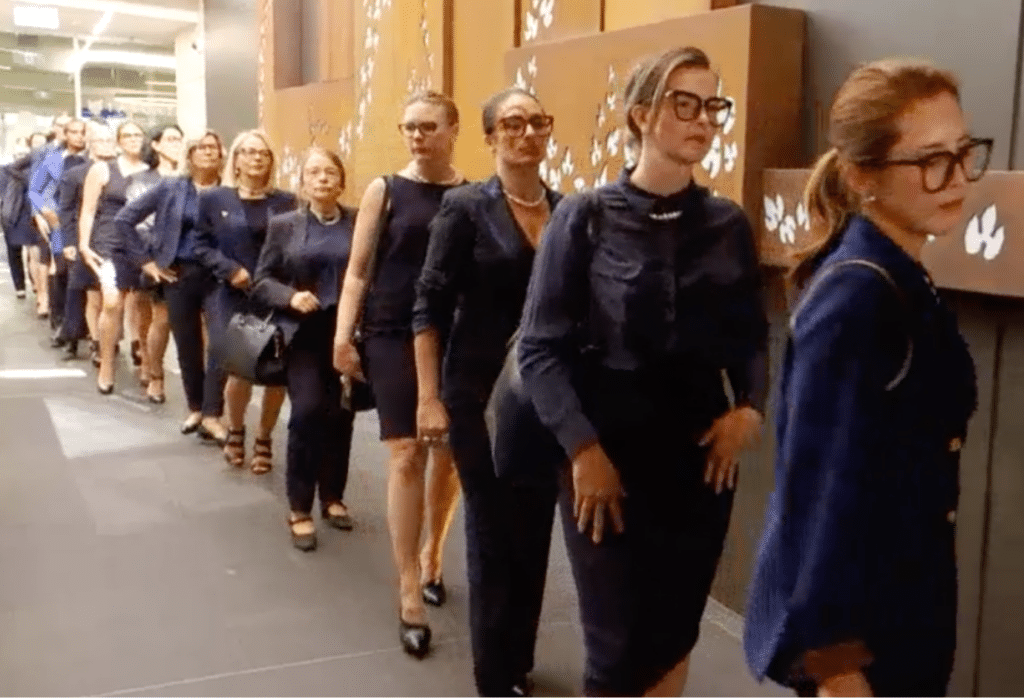In 2020, Tasmania’s infamous Museum of Old and New Art (MONA) in Hobart opened a “women-only” space within the museum, containing unique artworks and lush, velvet lounges. It was designed by American-born artist Kirsha Kaechele, who said she wanted the space to be “rebellious, provocative, exclusive, self-indulgent.”
This week, Kaechele has been forced into a legal battle against a male patron who visited the museum in April 2023 and claimed that his denied entry into the lounge constitutes discrimination.
Kirsha Kaechele and her Ladies Lounge
Kaechele is the wife of MONA’s founder and owner, David Walsh, and the descendent of a Swiss watchmaker and founder of an American pickle empire. For years, she was known for her social artwork, including the garden-based social enterprise, 24 Carrot Gardens Project, which encouraged hands-on learning about nutrition and wellbeing for young people.
During the museum’s revamping in the early days of the pandemic, Kaechele had the idea to create “a conceptual artwork” where female guests can “feel completely indulged, showered with attention…healed by the rich green atmosphere and immersed in ladies-only energy, which is very special.”
“A women’s only space is rare and wonderful,” she said at the time.
The Ladies Lounge is a silk-curtain-partitioned private space in the gallery, with special artworks exhibited inside, including several priceless Picasso’s passed down to Kaechele from her great-grandmother. In late 2021, the space began to include a culinary aspect to the experience, offering High Tea for Two that “includes an array of preposterous morsels prepared by Mona’s executive chef Vince Trim and his team, matched refreshments, your very own butler, and museum entry”.
The meal wasn’t cheap — the museum charged $500 for a two-person degustation. One Herald journalist described the 12-course meal as “more degustation than high tea, more performance art than banquet.”
This week, Kaechele reiterated her stance, arguing that the space aims to push back against the inequality women have always faced, and that it is a space for them “to retreat, to escape the patriarchy, to enjoy the company of each other”.
“I think the rejection of men is a very important part of the artwork,” she told the ABC.
On Tuesday, her conceptual artwork was adjudicated by the law.
The tribunal case
NSW resident Jason Lau represented himself this week at the Tasmanian Civil and Administrative Tribunal (TasCAT). He is attempting to argue that Kaechele’s Ladies Lounge breaches anti-discrimination laws, and wants the museum to reduce the entry cost for men, or allow them admission into the exclusive women-only space. Both suggestions have been rejected by the museum’s lawyers.
In the one-day hearing held in Hobart on Tuesday, TasCAT’s deputy president Richard Grueber led proceedings.
Jason Lau appeared via video link, explaining to the hearing: “I visited Mona, paid $35, on the expectation that I would have access to the museum, and I was quite surprised when I was told that I would not be able to see one exhibition, the Ladies Lounge.”
“Anyone who buys a ticket would expect a fair provision of goods and services,” he said.
Lau continued, saying that the goal or intent of the lounge to champion equal opportunity for women was unclear. He called upon Section 26 of the Tasmania’s Anti-Discrimination Act 1998, which states:
“A person may discriminate against another person in any program, plan or arrangement designed to promote equal opportunity for a group of people who are disadvantaged or have a special need because of a prescribed attribute.”
According to Lau, the section was “designed to permit positive discrimination and not negative discrimination.”
The museum’s counsel, Catherine Scott, responded by arguing that Section 26 permits discrimination in a program that promotes equal opportunity for disadvantaged groups.
She elaborated, saying that the Lounge is discriminatory by nature, since the mission of the space is to offer equal opportunity to a disadvantaged group — which in this case, are women, who have historically been barred from many places.
In her witness statement, Kaechele agreed with Lau’s argument that men are being disadvantaged by being denied access to the lounge.
“I side with Mr Lau and acknowledge that his description of loss is indeed substantial,” Kaechele said. “The ladies lounge … holds several of the most precious artworks of the collection.”
Kaechele noted that women in Australia were barred from pubs until 1965. In some regions, the laws didn’t change until 1970.
“Over history women have seen significantly fewer interiors,” she said. She also mentioned the “several” exclusive men-only clubs across the country that continue to exist. For Kaechele, the lounge was her personal response to her “lived experience” as a woman who has been denied entry into a pub due to her gender.
Kaechele argued that women should obtain special privileges over the next three centuries in order to equalise the injustices they have faced throughout history.
TasCAT is due to hand down its decision at a later date.
Kaechele’s tribunal appearance as performance art
On Tuesday, Kaechele arrived at the tribunal accompanied by over 20 female supporters dressed in dark suits and pearl necklaces. They walked into the proceedings in a theatrical display of unity, taking steps in sync to the tune of Robert Palmer’s Simply Irresistible.
“The hearing really felt like the art coming to life, it was a living part of the work,” Kaechele told the ABC, adding that if the tribunal finds in Lau’s favour, she would take the case to the State’s Supreme Court.


